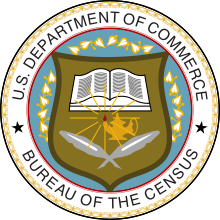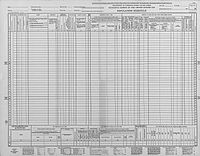The 1940 United States census, conducted by the Census Bureau, determined the resident population of the United States to be 132,164,569, an increase of 7.6 percent over the 1930 population of 122,775,046 people. The census date of record was April 1, 1940.
| Sixteenth census of the United States | ||
|---|---|---|
| ||
 U.S. Census Bureau seal | ||
 Population schedule | ||
| General information | ||
| Country | United States | |
| Results | ||
| Total population | 132,164,569 ( | |
| Most populous | New York 13,479,142 | |
| Least populous | Nevada 110,247 | |
A number of new questions were asked including where people were five years before, highest educational grade achieved, and information about wages. This census introduced sampling techniques; one in 20 people were asked additional questions on the census form. Other innovations included a field test of the census in 1939. This was the first census in which every state (48) had a population greater than 100,000.
Census questions
editThe 1940 census collected the following information:[1]
- address
- home owned or rented
- if owned, value
- if rented, monthly rent
- whether on a farm
- name
- relationship to head of household
- sex
- race
- age
- marital status
- school attendance
- educational attainment
- birthplace
- if foreign born, citizenship
- location of residence five years ago and whether on a farm
- employment status
- if at work, whether in private or non-emergency government work, or in public emergency work (WPA, CCC, NYA, etc.)
- if in private or non-emergency government work, hours worked in week
- if seeking work or on public emergency work, duration of unemployment
- occupation, industry and class of worker
- weeks worked last year
- wage and salary income last year
In addition, a sample of individuals were asked additional questions covering age at first marriage, fertility, and other topics. Full documentation on the 1940 census, including census forms and a procedural history, is available from the Integrated Public Use Microdata Series.
Data availability
editFollowing completion of the census, the original enumeration sheets were microfilmed; after which the original sheets were destroyed.[2]
As required by Title 13 of the U.S. Code, access to personally identifiable information from census records was restricted for 72 years.[3] Non-personally identifiable information Microdata from the 1940 census is freely available through the Integrated Public Use Microdata Series. Also, aggregate data for small areas, together with electronic boundary files, can be downloaded from the National Historical Geographic Information System.
On April 2, 2012[4]—72 years after the census was taken—microfilmed images of the 1940 census enumeration sheets were released to the public by the National Archives and Records Administration.[5][6] The records are indexed only by enumeration district upon initial release; several organizations are compiling indices, in some cases through crowdsourcing.[7]
State rankings
edit
| Rank | State | Population as of 1940 census[8] |
Population as of 1930 census |
Change | Percent change |
|---|---|---|---|---|---|
| 1 | New York | 13,479,142 | 12,588,066 | 891,076 | 7.1% |
| 2 | Pennsylvania | 9,900,180 | 9,631,350 | 268,830 | 2.8% |
| 3 | Illinois | 7,897,241 | 7,630,654 | 266,587 | 3.5% |
| 4 | Ohio | 6,907,612 | 6,646,697 | 260,915 | 3.9% |
| 5 | California | 6,907,387 | 5,677,251 | 1,230,136 | 21.7% |
| 6 | Texas | 6,414,824 | 5,824,715 | 590,109 | 10.1% |
| 7 | Michigan | 5,256,106 | 4,842,325 | 413,781 | 8.5% |
| 8 | Massachusetts | 4,316,721 | 4,249,614 | 67,107 | 1.6% |
| 9 | New Jersey | 4,160,165 | 4,041,334 | 118,831 | 2.9% |
| 10 | Missouri | 3,784,664 | 3,629,367 | 155,297 | 4.3% |
| 11 | North Carolina | 3,571,623 | 3,170,276 | 401,347 | 12.7% |
| 12 | Indiana | 3,427,796 | 3,238,503 | 189,293 | 5.8% |
| 13 | Wisconsin | 3,137,587 | 2,939,006 | 198,581 | 6.8% |
| 14 | Georgia | 3,123,723 | 2,908,506 | 215,217 | 7.4% |
| 15 | Tennessee | 2,915,841 | 2,616,556 | 299,285 | 11.4% |
| 16 | Kentucky | 2,845,627 | 2,614,589 | 231,038 | 8.8% |
| 17 | Alabama | 2,832,961 | 2,646,248 | 186,713 | 7.1% |
| 18 | Minnesota | 2,792,300 | 2,563,953 | 228,347 | 8.9% |
| 19 | Virginia | 2,677,773 | 2,421,851 | 255,922 | 10.6% |
| 20 | Iowa | 2,538,268 | 2,470,939 | 67,329 | 2.7% |
| 21 | Louisiana | 2,363,516 | 2,101,593 | 261,923 | 12.5% |
| 22 | Oklahoma | 2,336,434 | 2,396,040 | −59,606 | −2.5% |
| 23 | Mississippi | 2,183,796 | 2,009,821 | 173,975 | 8.7% |
| 24 | Arkansas | 1,949,387 | 1,854,482 | 94,905 | 5.1% |
| 25 | West Virginia | 1,901,974 | 1,729,205 | 172,769 | 10.0% |
| 26 | South Carolina | 1,899,804 | 1,738,765 | 161,039 | 9.3% |
| 27 | Florida | 1,897,414 | 1,468,211 | 429,203 | 29.2% |
| 28 | Maryland | 1,821,244 | 1,631,526 | 189,718 | 11.6% |
| 29 | Kansas | 1,801,028 | 1,880,999 | −79,971 | −4.3% |
| 30 | Washington | 1,736,191 | 1,563,396 | 172,795 | 11.1% |
| 31 | Connecticut | 1,709,242 | 1,606,903 | 102,339 | 6.4% |
| 32 | Nebraska | 1,315,834 | 1,377,963 | −62,129 | −4.5% |
| 33 | Colorado | 1,123,296 | 1,035,791 | 87,505 | 8.4% |
| 34 | Oregon | 1,089,684 | 953,786 | 135,898 | 14.2% |
| 35 | Maine | 847,226 | 797,423 | 49,803 | 6.2% |
| 36 | Rhode Island | 713,346 | 687,497 | 25,849 | 3.8% |
| — | District of Columbia | 663,091 | 486,869 | 176,222 | 36.2% |
| 37 | South Dakota | 642,961 | 692,849 | −49,888 | −7.2% |
| 38 | North Dakota | 641,935 | 680,845 | −38,910 | −5.7% |
| 39 | Montana | 559,456 | 537,606 | 21,850 | 4.1% |
| 40 | Utah | 550,310 | 507,847 | 42,463 | 8.4% |
| 41 | New Mexico | 531,818 | 423,317 | 108,501 | 25.6% |
| 42 | Idaho | 524,873 | 445,032 | 79,841 | 17.9% |
| 43 | Arizona | 499,261 | 435,573 | 63,688 | 14.6% |
| 44 | New Hampshire | 491,524 | 465,293 | 26,231 | 5.6% |
| — | Hawaii | 422,770 | 368,300 | 54,470 | 14.8% |
| 45 | Vermont | 359,231 | 359,611 | −380 | −0.1% |
| 46 | Delaware | 266,505 | 238,380 | 28,125 | 11.8% |
| 47 | Wyoming | 250,742 | 225,565 | 25,177 | 11.2% |
| 48 | Nevada | 110,247 | 91,058 | 19,189 | 21.1% |
| — | Alaska | 72,524 | 59,278 | 13,246 | 22.3% |
| — | United States | 132,165,129 | 123,202,660 | 8,962,469 | 7.3% |
City rankings
editLocations of 50 most populous cities
editUse for Japanese American internment
editDuring World War II, the Census Bureau responded to numerous information requests from US government agencies, including the US Army and the US Secret Service, to facilitate the internment of Japanese Americans. In his report of the operation, U.S. Army Lt. Gen. John L. DeWitt wrote that "The most important single source of information prior to the evacuation was the 1940 Census of Population."[11][12][13]
References
edit- ^ "Library Bibliography Bulletin 88, New York State Census Records, 1790–1925". New York State Library. October 1981. p. 45 (p. 51 of PDF). Retrieved December 15, 2008.
- ^ The Ancestry Insider (May 16, 2012). "1940 Census Update for 16 May 2012: Bad News". www.ancestryinsider.blogspot.com. Retrieved May 17, 2012.
- ^ "Historical Background". US Census Bureau. Archived from the original on June 12, 2009. Retrieved July 2, 2009.
- ^ "1940 Census". Archived from the original on January 3, 2007. Retrieved November 26, 2006.
- ^ Weinstein, Allen (April 2008). "Access to genealogy data at NARA grows" (PDF). NARA Staff Bulletin. Washington DC: National Archives and Records Administration. Retrieved July 2, 2009.
- ^ Weinstein, Allen (Summer 2008). "Finding Out Who You Are: First Stop, National Archives". Prologue magazine, vol. 40, no. 2. Washington DC: National Archives and Records Administration. Retrieved July 2, 2009.
- ^ Daley, Bill (March 27, 2012). "Unlocking a new door to the 1940s – 1940 census details to be released to public". Chicago Tribune. Retrieved March 20, 2012.
- ^ "1940 Census of Population: Volume 1. Number of Inhabitants".
- ^ Population of the 100 Largest Cities and Other Urban Places in the United States: 1790 to 1990, U.S. Census Bureau, 1998
- ^ "Regions and Divisions". U.S. Census Bureau. Archived from the original on December 3, 2016. Retrieved September 9, 2016.
- ^ Japanese evacuation from the West coast, 1942 : final report, by De Witt, J. L. (John Lesesne), b. 1880; United States. Army. Western Defense Command
- ^ Confirmed: The U.S. Census Bureau Gave Up Names of Japanese-Americans in WW II
- ^ Some Japanese-Americans Wrongfully Imprisoned During WWII Oppose Census Question
External links
edit- Official 1940 census website
- 1940 Census Records from the U.S. National Archives and Records Administration
- 1940 Federal Population Census Videos, training videos for enumerators at the U.S. National Archives
- Selected Historical Decennial Census Population and Housing Counts from the U.S. Census Bureau
- Snow, Michael S. (opinion) "Why the huge interest in the 1940 Census?" CNN. Monday April 9, 2012.
- 1941 U.S Census Report Contains 1940 census results
- 1940 Census Questions Hosted at CensusFinder.com.